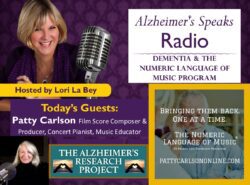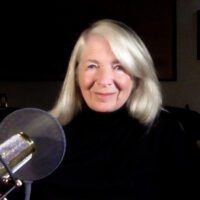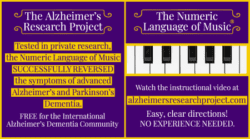The Alzheimer’s Research Project
 The Alzheimer’s Research Project
The Alzheimer’s Research Project
Submitted by Patty Carlson
Patty Carlson Enterprises, LLC
Lori La Bey is a remarkable person. That may seem an unlikely way to begin a blog post about my work with Alzheimer’s and Parkinson’s disease, but she is definitely the sole reason I am writing to you now.
History
As a predominantly self taught film score composer and concert pianist, I understood music as a numeric language. In 1984, I began teaching my understanding of this language via the piano keyboard. Students of my program began composing and performing music so well so fast, producers from Los Angeles filmed two of my lessons. I rapidly became an international celebrity for my instructional videos.
Curious as to why what I was teaching produced such different results from conventional music education, I began a comparative analysis between the two systems. I realized the program I taught altered the understanding of music from the very core of the instruction permeating the entire system.
I applied for and was granted a US Patent for a new method of conveying music information.
I began a development case study program to document the extraordinary composition and performance results of students. During filming, it was brought to my attention the program was producing additional changes.
Students hand writing advanced from the worst in the class to the best in the class. Reading grades increased from a first grade level to a fifth grade, 3rd month level. High school students math grades increased from D’s and failing to 98 and 100%.
Not Just Improved Performance
The program was also affecting behavior.
A high school girl had been placed in a response to intervention program without success. The girl was non social, not participating in class and failing math. Reluctant to place her daughter on suggested pharmaceuticals, the mother contacted me to see if my program could help. Five weeks later, her daughter was participating in class, had a 100% in her math test and joined the basketball team.
Results I had been documenting in accelerated academic achievement were only available after months of study in the form of report cards and teacher parent conferences. I was of the opinion the results were related to playing the numeric sequences on the piano over a significant period of time.
Only when I began testing the program with special needs children did I realize the changes started with the introduction of the numeric sequences of the program. Having not touched the keyboard even one time from the first session, the children performed the exercises fluently and flawlessly as though they had practiced at least an hour a day.
Math, Music, and the Mind
If just the introduction of the information was initiating change, I was compelled to know if the program could help people with Alzheimer’s disease. I tested the program at the local assisted living center with advanced Alzheimer’s, advanced Parkinson’s and long term stroke disability.
Symptoms significantly reversed in all three cases.
I documented the program I had used in a step by step instructional manual. If the information was repeated without deviation, would the results be the same?
Talking with the local postmaster about my work, Martha asked if the program could help her two grandchildren. Her eleven year old grandson was going into fifth grade functioning at a third grade level. Her three year old grandson had been diagnosed with childhood apraxia of speech.
As always, I told her I could not say what the program can do, only what it has done. Martha agreed to test the program with her grandsons for me from the directions in the manual. Three months later, her oldest grandson had advanced from a 3.4 reading level to a 5.8 reading level. His math teacher said he had never seen a student advance in math as fast as her grandson!
Her three year old grandson had a 70% increase in his ability to speak. Only later did I learn childhood apraxia of speech is incurable. Most children live with the inability to speak their entire life.
Numeric Language of Music
Now that I was confident the program had potential to succeed if used by other caregivers, I began to research Alzheimer’s associations. The first site I clicked on was Lori La Bey’s Alzheimer’s Speaks.
 I was acutely aware of the reality families face when receiving a diagnosis of Alzheimer’s or Parkinson’s disease. The struggle to accept the inevitable loss of one’s mind, the knowledge there is no known cure, the emotional tsunami they already survived to accept their fate in addition to the many years of loss of one’s loved one already endured at advanced stages of the disease.
I was acutely aware of the reality families face when receiving a diagnosis of Alzheimer’s or Parkinson’s disease. The struggle to accept the inevitable loss of one’s mind, the knowledge there is no known cure, the emotional tsunami they already survived to accept their fate in addition to the many years of loss of one’s loved one already endured at advanced stages of the disease.
I was unsure of how to approach anyone with my thoughts the Numeric Language of Music program may potentially reverse the disease. Lori La Bey is a renowned spokesperson for the international Alzheimer’s Dementia community who had never heard of me or my work. I sent an email to Lori asking to speak with her prior to her considering to have me as a guest on her show.
First, I want to say, we instantly became friends. I explained to her why I had reached out to her, the results I had documented over several decades, and my thoughts of advancing the research by offering the Alzheimer’s Dementia community the program to test.
Lori took the time to review my websites documenting the history of my work. She watched the instructional video. She invited me to appear on a video interview with her giving both myself and the Alzheimer’s Dementia community the opportunity to find out if the Numeric Language of Music program can reverse Alzheimer’s and Parkinson’s disease.
Get Involved!
Now it’s up to all of you. Test the program. It’s easy. It’s free. You need no prior experience. Concerned you don’t know anything about a piano? Not a problem. Just watch the 20 minute instructions on the Alzheimer’s Research Project website. You’ll know immediately you can do this.
The program has already successfully reversed the symptoms of advanced Alzheimer’s and Parkinson’s disease. Common sense suggests anyone at any stage of the disease should test the program.
Join the Alzheimer’s Research Project in our quest to learn more about the extraordinary relationship between math, music and the mind.

Patty Carlson
Alzheimer’s Research Project
More from Patty Carlson:


